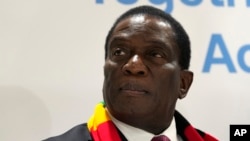WASHINGTON - President Emmerson Mnangagwa says Zimbabwe will hold crucial council, parliamentary and presidential elections on August 23 this year.
Announcing the election dates in an extraordinary government gazette, Mnangagwa said a runoff election “if such a poll becomes necessary in terms of section 38(1)(a)(iii) of the Electoral Act”, shall be held on October 2.
In his proclamation, the president also said the election of chiefs to the Council of Chiefs will be on August 3, 2023.
Nomination courts in relation to the election to the office of president shall sit on the 21st day of June, 2023, commencing at 10 o’clock in the morning, in the High Court, Court A, Mapondera Building, Samora Machel Avenue, Harare.
The president also announced that in relation to the election of 210 members of the National Assembly, a nomination court shall sit on the 21st day of June, 2023, commencing at 10 o’clock in the morning at various judicial centers in all provinces.
Meanwhile, the Associated Press reports that opposition parties have already made allegations of violence and intimidation against their supporters in the buildup to the elections, and human rights groups have said Mnangagwa is silencing criticism.
The southern African nation has only had two leaders since it gained independence from white minority rule in 1980. Robert Mugabe led Zimbabwe for 37 years until he was removed and replaced by Mnangagwa in a coup in 2017. Mnangagwa had served as a vice president under Mugabe.
The last general election was held in 2018, nearly a year after the coup.
Once a close ally of Mugabe, Mnangagwa, 80, has tried to present himself as a reformer despite accusations that he is even more repressive than the man he helped remove from power.
Mnangagwa is expected to face a strong challenge from Nelson Chamisa, the 45-year-old leader of the main opposition party, Citizens Coalition for Change. Chamisa narrowly lost to Mnangagwa in 2018, with the Constitutional Court dismissing his claims of election rigging.
Apart from the presidency, the election will also decide the composition of the 300-seat parliament and close to 2,000 local council positions.
Mnangagwa’s ZANU-PF ruling party and the government have denied allegations of violence and intimidation by ruling party activists and security forces. But rights groups have accused Mnangagwa’s government of intimidation and of suppressing any criticism and opposition amid a currency crisis and a sharp rise in food prices.
Zimbabwe has faced severe economic problems for years and has been under U.S. sanctions for two decades over human rights abuses. Mugabe died in 2019.
Chamisa said this week he is ready for the election, but has made allegations of voting roll irregularities. Compounding that, Chamisa said his party is at a disadvantage because Mnangagwa and ZANU-PF control state–run media and hold sway over the police, other security forces and the judiciary, which are used to clamp down on dissent.
On Wednesday, Fadzayi Mahere, spokeswoman for the Citizens Coalition for Change, tweeted: “No govt that’s popular & knows it’s winning behaves like this. They’re terrified cause, like all of us, they know that ZANU PF can never win a free & fair election in Zimbabwe."
"That’s why they’re trying to stitch & doctor the voters’ roll but it won’t work. People want change.”
Opposition parties had accused Mnangagwa of delaying announcing a date for the election that must take place before the end of August.
Mnangagwa's announcement came a day after Zimbabwe's foreign ministry summoned the United States’ deputy ambassador over a series of tweets the embassy sent calling for a peaceful election.
The ministry accused the embassy of “election-related social media posts bordering on activism and meddling in Zimbabwe’s internal affairs.”
Deputy Ambassador Elaine French was called to a meeting with Zimbabwe foreign affairs acting permanent secretary Rofina Chikava on Tuesday following the posts on the U.S. Embassy's official Twitter account.
The Zimbabwe foreign ministry said it had a particular issue with a May 26 tweet that called for Zimbabweans to “Register to vote and make sure your voice is heard.” Another tweet from the embassy said “Zimbabwe’s constitution grants citizens the right to choose their representatives in legitimate, credible, & peaceful elections.”
The foreign ministry said the tweet urging people to register to vote was against diplomatic protocols.
“We stand by our recent social media posts calling for peace during the election season," U.S. Embassy spokeswoman Meg Riggs said in a statement. “Elections are a part of a functioning democracy.”





Forum